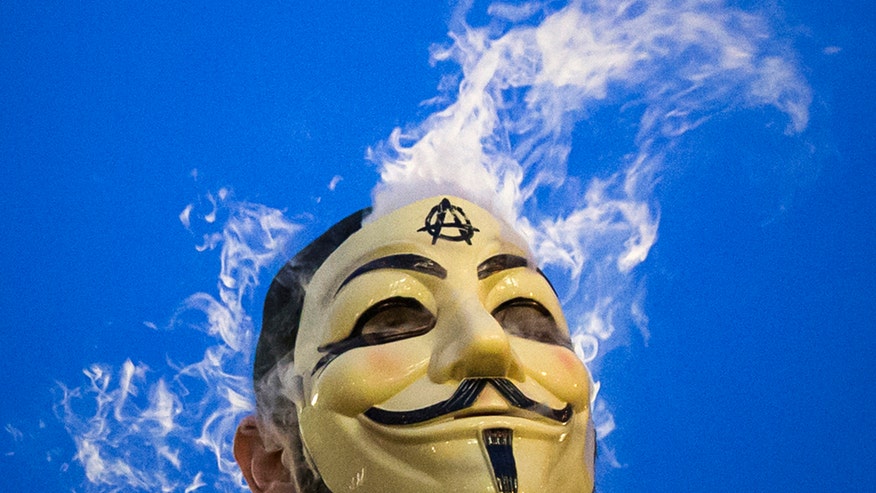
File photo. (REUTERS/Elizabeth Shafiroff)
“Targeting of high profile events such as the G20 by state-sponsored or other foreign adversaries, cyber criminals and issue-motivated groups is a real and persistent threat,” a defense department spokesperson told FoxNews.com.
Among the dozens of groups planning physical protests on the sidelines of the annual meeting of the world’s largest economies is Anonymous. Group members often wear their signature Guy Fawkes masks while appearing in public, but they’re most notorious for cyber attacks on high-profile government and corporate websites around the world.
Anonymous attacks have targeted the websites of PayPal, the FBI and many others. One of the group’s signature strategies is to use “Denial of Service” attacks, which floods networks with useless traffic, effectively crippling them.
Since the debut of the G20 leaders’ summit in 2008, activists have used the event to spotlight social injustice, corporate corruption and climate change. But it’s also an opportunity to gain attention through cyberprotests, according to Dr. Ernest Foo, a computer scientist with the Queensland University of Technology.
“Certainly, in the case of the G20, with all the heads of state here, it means there’s a lot more eyes from all over the world who are looking at this particular location, and there’s an opportunity for people to protest without actually being here,” Foo said.
“Information is Power”
Beyond so-called “hacktivism,” digital espionage is also a concern.
“It’s more than likely that some espionage may occur,” Foo said. “Hackers might be able to take over a telephone or a computer or something like that and be able to extract files or listen in on conversations.”
It’s a growing threat at high-profile gatherings of world leaders.
“It’s basically become the next frontier now,” Foo said. “Information is power.”
In 2011, the French government said a “spectacular” cyber attack from hackers traced to China targeted documents about international economic affairs related to the G20 in Paris. The attack reportedly forced the country’s finance ministry to shut down 10,000 computers.
The National Security Agency, along with Canadian intelligence officials, carried out spying operations during the G8 and G20 summits in Toronto in 2010, according to a CBC News report based on documents leaked by former NSA contractor Edward Snowden.
The Australian Signals Directorate, the country’s electronic intelligence agency, has warned this year’s G20 delegates to avoid opening suspicious emails and using public, unsecured Wi-Fi, as well as unfamiliar USB flash drives.
“The information contained on government systems, whether classified or unclassified, is of strategic interest to cyber adversaries,” a defense spokesperson said. “Information gathered through cyber espionage can be used to gain an economic, diplomatic or political advantage.”
But cyber attacks may be unavoidable.
“Hacks are so sophisticated that organizations won’t even know it’s happened to them,” said Nigel Phair, a technology consultant who works with Australia’s Council of Registered Ethical Security Testers (CREST).
Phair said just one mistaken click on a government computer could open the door to cyberthieves.
“The weakest link is always people,” Phair added.
System Failure
Cyber security experts say Australia’s infrastructure to protect delegates, government officials and corporations from online attacks is sophisticated, with firewalls and secured information networks to combat digital intruders.
But analysts warn it’s doubtful the government will be able to prevent every cyber attack.
“They have the capability to prevent cyber attacks but it’s very difficult,” Foo said. “It’s more than likely that there will be some kind of cyber attack during the G20, it just depends on how serious it’s going to be.”
Among the greatest concerns is the threat of hackers taking over critical technology like power stations, water treatment plants, transport systems and traffic lights.
“They would be able to remotely gain access to and alter one of those systems,” according to Foo. “It would make a big statement if they were able to do that.”
So while thousands of police officers patrol Brisbane, helicopters circle overhead, and regular ground searches are performed, cybersecurity patrolmen are taking their own precautions to guard against what could be a potential disaster in the digital space.
No comments:
Post a Comment